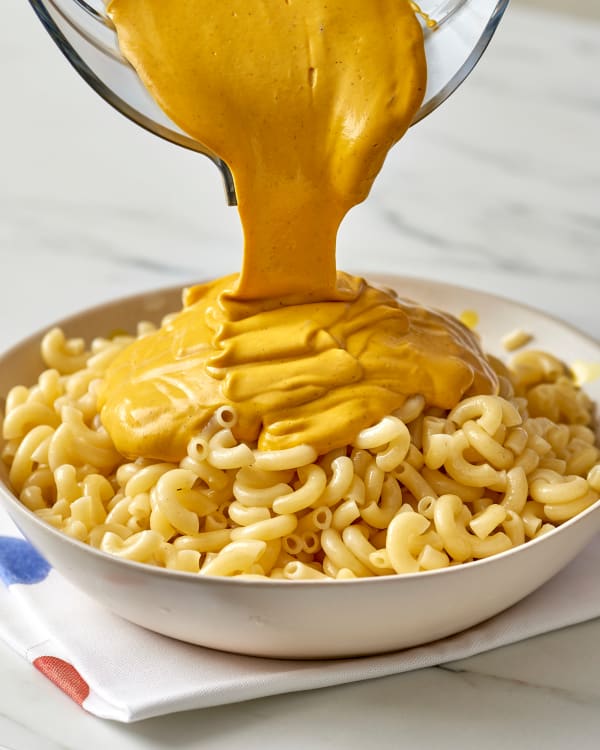Can I Use Vegetable Oil Instead Of Butter For Mac And Cheese
Most all margarines are nothing but butter flavored vegetable oil, or sunflower oil or cotton seed oil. You could ever use pork fat i love mac and cheese with ham or bacon in it. Source(s): retired chef. Dec 05, 2016 Olive Oil: Olive oil can be used as a substitute for butter in baking by using 3/4 cup of olive oil for every cup of butter called for. Note that olive oil has a strong flavor, works best in savory items like herb breads or biscuits, and would likely hurt the flavor of sweeter items, such as cakes, cookies, or pie crusts. The most important thing to remember is that coconut oil can be substituted in a 1:1 ratio for unsalted butter in any baking recipe. For even more accuracy, we suggest using a weight measurement as opposed to a volumetric measurement. One of the places I always use butter is when creating a homemade cheese sauce. This time, I decided to try making one with olive oil! And, in an effort to expand my horizons beyond homemade mac and cheese, which I’ve been eating a lot of lately, I thought I’d try this new sauce drizzled over broccoli!
Substituting one ingredient for another should only be done when you don’t have the necessary ingredient on hand in your kitchen. Substitutions can change the flavor and outcome of the finished baked goods. The following chart gives substitutions that may be used to achieve a product similar to the original when cooking. Find out what to substitute when you’re out of an ingredient – but also remember the following when substituting: When substituting ingredients, take into account the differences in taste, moisture content, texture and weight. When substituting for sugar and flour, consider the differences in sweetening and thickening power. Understand the physical and chemical properties of all ingredients.
Can I Use Vegetable Oil Instead Of Coconut Oil
Measuring accurately will help avoid disappointment.
There are a few reasons why you may need to find a substitute for in your diet. Milk Allergy While butter is very low in protein, it still contains a small amount of, which is a protein in milk that can be allergenic (). If you have a milk allergy, it's important to be cautious of your butter intake. You may need to avoid it completely if your allergy is severe. Lactose Intolerance People with lactose intolerance tend to tolerate the small amounts of without adverse reactions (). However, some are more sensitive to lactose than others and may have to avoid butter for this reason.
Health Reasons Some individuals avoid butter because it's high in, which was previously believed to cause heart disease. However, new studies have shown that this isn't the case (,, ). That being said, some studies suggest that the saturated fats in butter may raise cholesterol more than the saturated fats in other dairy products, such as cream (). Also, butter is high in fat and therefore high in calories.
People who are trying to reduce calories may want to cut back on butter for this reason. Others choose to limit their butter intake because it isn't very nutritious when compared to its high number of calories per serving (). Internet explorer extension on chrome. Bottom Line: Some people may need to avoid butter due to milk allergies or lactose intolerance, while others avoid it for personal health reasons.
Can You Use Vegetable Oil Instead Of Shortening
Butter is used in baking as a leavening agent, meaning it introduces air into baked goods and makes them light and fluffy. Additionally, butter contributes to the flaky, moist texture of baked goods, as well as their rich and tasty flavors. Without these properties, baked goods might be flat, dry and flavorless.

The good news is that there are plenty of delicious butter alternatives that can serve the same purposes in baking. Bottom Line: Butter functions as a leavening agent in baked goods, and it also provides texture and flavor.
The following fats and oils have properties that are comparable to butter, making them great substitutes. Ghee Ghee is a type of clarified butter with an aromatic and nutty taste. In baked goods where a strong, buttery flavor is desirable, it can replace butter at a 1-to-1 ratio. Substituting ghee for butter works best with items that are baked at high temperatures and served warm, such as breads and cookies.
However, it provides more moisture than butter does, so you may need to alter the amount of liquid and flour added to recipes when using ghee. Coconut Oil can also replace butter in baking at a 1-to-1 ratio. The one downfall is that it may slightly change the flavor, with some types of coconut oil affecting taste more than others. Unrefined coconut oil tends to taste more 'coconut-like' than refined coconut oil. It works great for recipes that require tropical or rich chocolate flavors. If coconut is not the flavor you're looking for, you can use a more refined brand of coconut oil or a different substitute. Olive Oil In most recipes, can be substituted for butter at a 3-to-4 ratio.